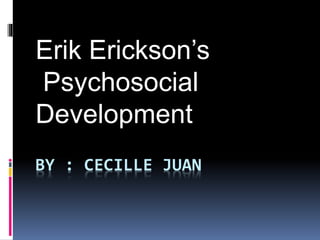
Erik Erikson and Jean Piaget's Theory of Development
- 1. Erik Erickson’s Psychosocial Development BY : CECILLE JUAN
- 2. Erik Erikson (1902-1996) One of the tenets of his theory, that a person’s social view of self is more important than instinctual drives in determining the behavior, allows for more optimistic view of the possibilities for human growth. 8 stages covering the entire life span. At each stage, there is conflict between two opposing forces.
- 3. First Stage:Trust vs. Mistrust Infant (birth – 18 mos) • At this stage, an infant develops their sense of trust. With proper care and attention, the child will be able to trust. However, if this does not happen, it leads to mistrust in the child’s life. • Important events: Feeding
- 4. Autonomy vs. Shame and Doubt Occurs in the toddler age. (18 months-3 years). Child needs to develop a sense of personal control over physical skills and a sense of independence. Or they could start feeling ashamed and doubt their abilities, when caregivers are impatient and do everything for them. Important event: toilet training
- 5. Initiative vs. Guilt Preschool age (3-5 years old). Using initiative in planning or carrying out plans. Initiative has discovered that learning new things is fun. Or develop a sense of guilt over misbehavior regarding parents limits or being criticized of activities done.
- 6. Industry vs. Inferiority School age (5-11 years of age). Learn to follow the rules imposed by schools or home. Or the child can start believing they are inferior to others. Questions competency
- 7. Identity vs. Role Confusion Adolescence (11-18 years of age). Acquire a sense of identity. Who am I? Must need to explore their independence and developing sense of self to fit in the society will emerge a strong sense of self. Or can become confused about ones role in life once remain unsure of their beliefs and desires. Important events: Social Relationship
- 8. Intimacy vs. Isolation Young adulthood (18-40 years of age). Develop a relationship and joint identity with a partner. Or can become isolated and stay away from meaningful relationships. Questions if the person is ready for new relationships, or if there is a fear of rejection. Important events: Romantic Relationship
- 9. Generativity vs. Stagnation Middle adulthood (40-65 years of age). Making use of time and having a concern with helping others and guiding the next generation. “Making your Mark” on the world. stagnation refers to failure to find way to contribute. Important events: Parenthood and Work
- 10. Integrity vs. Despair Late adulthood (60-and up). Moment of reflecting back on life. Understand and accept the meaning of temporary life. Those feeling proud of their achievement will feel sense of integrity. complains about regrets, not having enough time, and not finding a meaning throughout life or life is wasted will give despair.
- 11. Jean Piaget’s Cognitive Development
- 12. Jean Piaget (1896-1980) Introduced the concepts or the way children learn and think . Defined 4 stages Each period is an advance over the previous one. To progress from one period to the next, children reorganize their thinking process to bring them closer to adult thinking.
- 13. The Sensorimotor Period (0-2 yrs.) 1-4 months- hand-mouth, eye-ear coordination (a rattle or tape of parent’s voice) 4-8mos- learns to initiate, recognize and repeat to pleasurable experiences from environment - Memory traces - good game, peek a boo
- 14. 8-12 mos.- play activities to attain special goals -activities of own body separate fine activity of objects - experience separation anxiety - toys most played are colored boxes 12-18 mos.- capable of space and time perception as well as permanence - play throw and retrieve (like ball playing) 18-24 mos. – uses memory and imitation to act - play: blocks, colored plastic ring
- 15. Preoperational Thought (2-7 yrs.) Learns to use language and to represent objects by images and words Thinking is still egocentric: has difficulty taking the viewpoint of others Classifies objects by a single feature: e.g. groups together all the red blocks regardless of shape or all the square blocks regardless of colour
- 16. Concrete Operations (7-11 yrs.) Can think logically about objects and events Achieves conservation of number (age 6), mass (age 7), and weight (age 9) Classifies objects according to several features and can order them in series along a single dimension such as size.
- 17. Formal Operations (11- adult) Can think logically about abstract propositions and test hypotheses systematically. Becomes concerned with the hypothetical, the future, and ideological problems.
